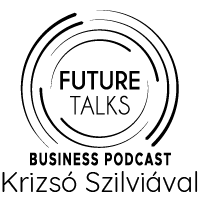Magazine: Self-knowledge is the most important skill in the 21st century
In the latest Future Talks podcast episode Szilvia Krizsó talked to Krisztián Steigervald, generations expert. The article features parts of the conversation that you can listen to at futuretalks.hu.

– As generations expert what do you think about the ‘why in my day’ exclamation?
– I allow myself to set here things right, because biologic age and belonging to a generation are two different ‘boxes’.

Krisztián Steigervald, generations expert
– These days six generations live. What kind of experiences do Veterans, Baby Boomers, Gen X, Y, Z and Alpha share?
– This issue is complex because the past 60-70 years brought about profound and significant changes in culture.
Veterans were born before 1945, in an era marked by war, which is why their childhood was blended with uncertainty. No wonder, that they have been after safety all life long.
Baby Boomers born in 1946-64 wanted to change the world, but with a Prussian-style, hierarchic approach, still politely. They understand the least why youngsters cannot greet anyone respectfully.
– Honestly, I can’t either. Why is that?
– For an answer we should have a look at the features of chat-based communication. It has no start and no end, thus provides no occasion to say hi or goodbye. As a matter of course, it has infiltrated into offline communication after a while.
Our generation, Gen X is made of people born in 1965-79, were strongly socialised with technical goods. And even if our childhood took place in the shade of stencil machines, today we use streaming services, listen to podcasts…etc. Our life has been full of changes, so we look for the safety of changes: Gen X-ers want to see and make changes even if there’s no reason for it.
Gen Y-ers were born in 1980-94 in a highly ego-centric world without the Internet. And the ego-centrism of Gen Y-ers gives rise to a lot of frustration in older employees and bosses.
– Vilmos Csányi called this ego-centrism a tendency jeopardising the future of our globe.
– I agree to a certain extent, but in a dual world we live in we must experience both sides. With a view to save planet Earth, we should see how we can find the golden middle.
Members of Generation Z (1995-2009) were born in a digital era and grew up with the Internet. Their decisions are largely shaped by a compulsion to choose, which also influences their approach to work where they will also constantly look for options.
The youngest generation, Gen Alpha were born in the world of smart devices and are ‘wired’ accordingly.

Krisztián Steigervald: „If generations better understand and appreciate each other, it may be easier to enter and survive in a new and yet unknown world”
– Which generation do you think will do best in 10-20 years?
– The most important skill that our children will need is self-knowledge. And this starts with parents who can help their children with patterns.
I think, each and every generation will find their place if they manage to form small communities that are aware of their internal resources and will help each other in order to survive.
– How can young people be managed these days?
– On the one hand, the employer-employee relationship needs to be redefined – employees will soon be users, not just workers of a company. On the other hand, a 21st century leader – just like a 21st century father – is no more authoritarian, but a mentor, a buddy, a humanistic person. And it is tough to find out how to become a humanistic leader, but also a great challenge requiring thorough self-knowledge. //
Related news
Change among business owners: Generation Y has become the new engine of Hungarian businesses
🎧 Hallgasd a cikket: Lejátszás Szünet Folytatás Leállítás Nyelv: Auto…
Read more >Hungary’s most comprehensive Generation Z research published
🎧 Hallgasd a cikket: Lejátszás Szünet Folytatás Leállítás Nyelv: Auto…
Read more >Related news
II. Green Gastronomy – Marketing Communication Workshop organized by the MMSZ HoReCa and Green Section
🎧 Hallgasd a cikket: Lejátszás Szünet Folytatás Leállítás Nyelv: Auto…
Read more >









